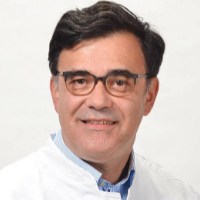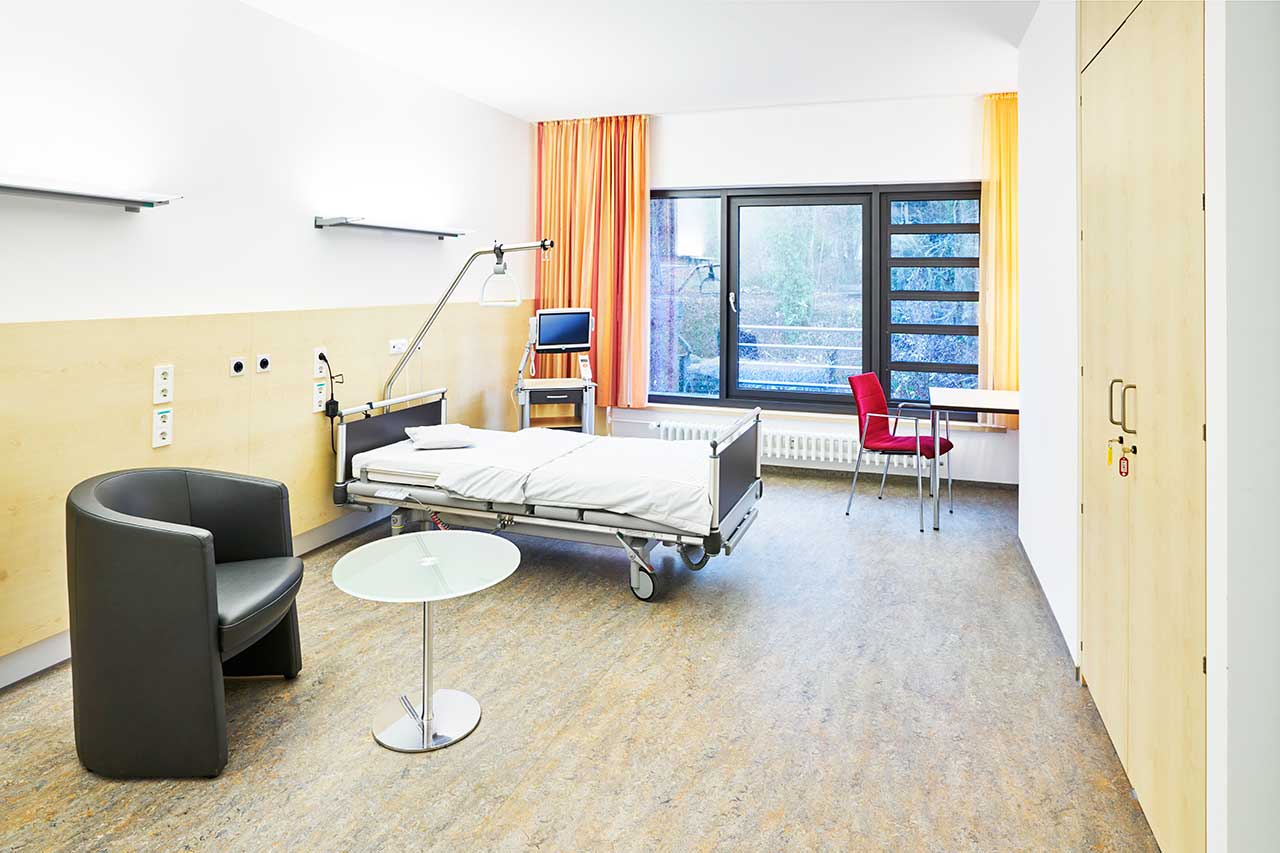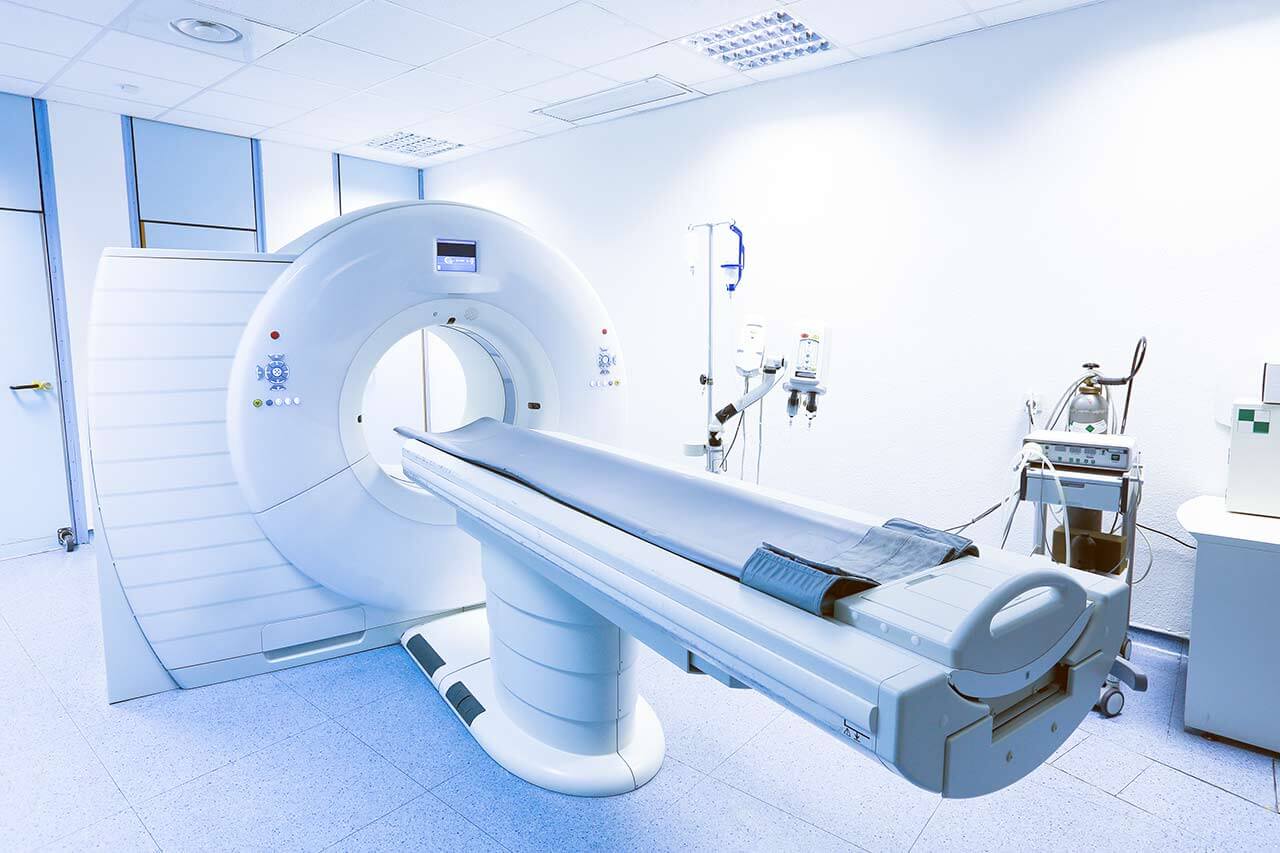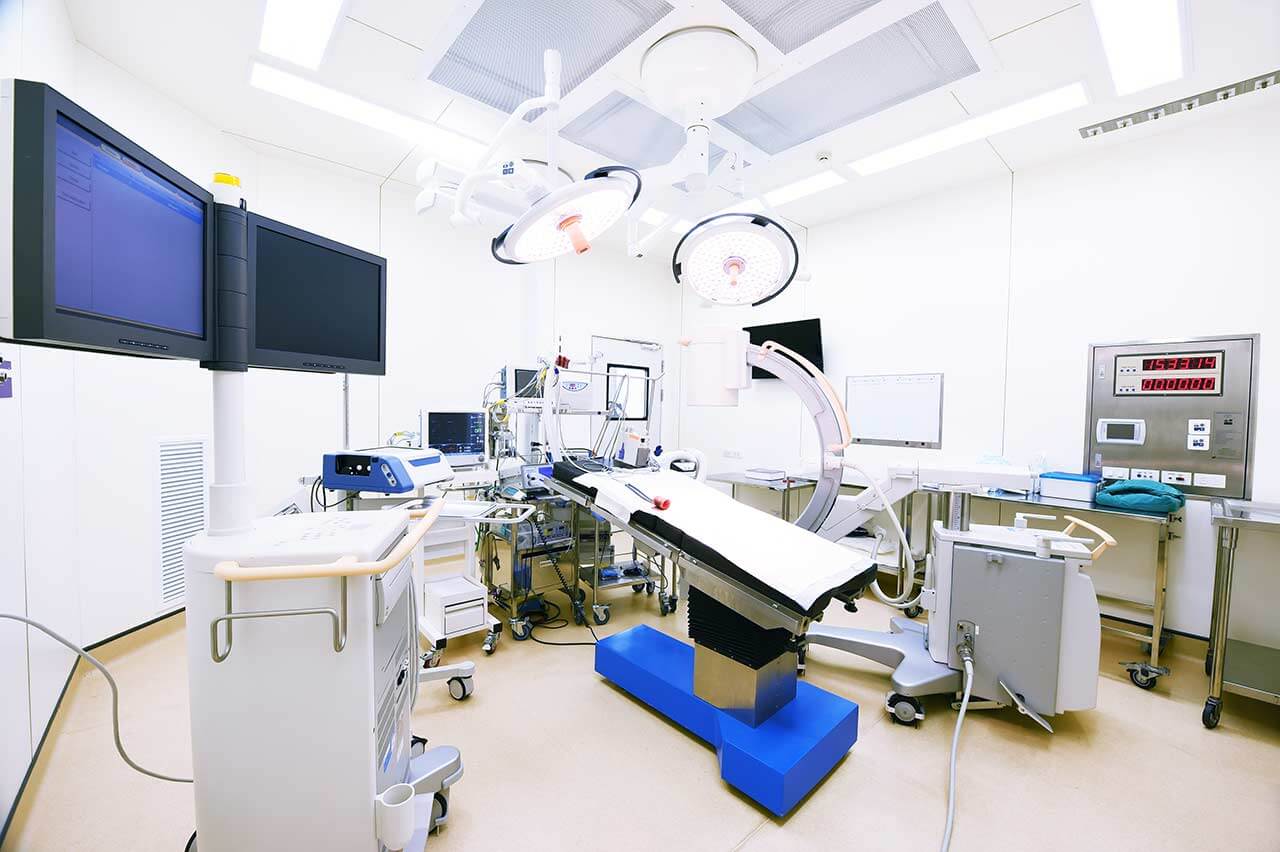
The program includes:
- Initial presentation in the clinic
- clinical history taking
- review of medical records
- physical examination
- laboratory tests:
- complete blood count
- inflammation indicators (CRP, ESR)
- indicators of blood coagulation
- tumor markers
- blood gas analysis
- chest x-ray
- electrocardiogram (ECG)
- echocardiography (ECHO)
- high-resolution computed tomography (HRCT)
- pulmonary function test
- biopsy of tumor with histological examination (on indication 2500 €)
- nursing services
- consultation of related specialists
- consultation of the chief physician and all leading experts
- development of individual treatment plan
- written statement
Required documents
- Medical records
- MRI/CT scan (not older than 3 months)
- Biopsy results (if available)
Service
You may also book:
 BookingHealth Price from:
BookingHealth Price from:
About the department
The Department of Thoracic Surgery at the University Hospital Erlangen offers all types of modern surgical interventions for the treatment of diseases of the lungs, thorax and mediastinal organs. The team of the department's surgeons specializes in operations of any complexity, ranging from minor diagnostic interventional procedures to serious operations using a heart-lung machine. One of the key clinical interests of the department's doctors is lung cancer treatment. The patients with this diagnosis receive interdisciplinary treatment that combines tumor resection, radiation therapy, and chemotherapy. Another area of specialization of the medical facility is laser thoracic surgery, which allows preserving the lung parenchyma, for example, in the treatment of lung metastases. The range of services is complemented by surgical correction of thoracic deformities in adults, for example, pectus excavatum, and minimally invasive endoscopic treatment of hyperhidrosis. In addition, the department's thoracic surgeons have a wealth of experience in innovative video-assisted thoracoscopic surgery. The Chief Physician of the department is Prof. Dr. med. Dr.h.c. Horia Sirbu.
The department's specialists are convinced that a decisive role in the successful treatment outcome is played by close cooperation with doctors from the related medical disciplines: pulmonologists, radiation therapists, oncologists and radiologists. In many cases, it is a multidisciplinary approach that provides the highest chances of recovery. Thanks to cooperation with the Comprehensive Cancer Center Erlangen, close contact of all colleagues involved in the patient's treatment and monitoring of his condition in dynamics is possible.
The availability of innovative technologies and modern medical equipment allows the department's doctors to perform many operations using video-assisted thoracoscopic surgery. The advantages of this technique are obvious – the absence of the need for thoracotomy significantly shortens and simplifies the recovery period after surgery. In addition, when performing such interventions, there is no need for artificial ventilation. Numerous studies confirm both high efficiency and safety of such interventions. The team of surgeons of the medical facility specializes in atypical lung resection, lymph node and mediastinal tumor resection, debridement for pleural empyema, bullectomy, lung volume reduction surgery, pericardial cyst resection, metastasis removal and other interventions using video-assisted thoracoscopic surgery techniques. The patient is already discharged from the hospital after a few days, while classic operations with thoracotomy require a long recovery period.
The department also offers advanced laser technologies for the removal of metastases in the lungs, including multiple ones. High-risk patients can also undergo laser surgery to resect a segment of the lung.
The team of thoracic surgeons working in the medical facility successfully performs thoracoscopic interventions for both diagnostic and therapeutic purposes. When performing such manipulations, a surgeon makes a small puncture of the chest wall and inserts a thoracoscope into the pleural cavity. The thoracoscope is a special instrument that is a narrow tube with a camera at the end. The method is minimally traumatic and, if performed professionally, does not cause any complications. The thoracoscopic technique is most often used in the department for lung and pleura biopsies, pleurodesis, and sympathectomy for hyperhidrosis.
The department's main clinical focuses include:
- Diagnostics and surgical treatment of lung cancer
- Diagnostics and surgical treatment of chest wall tumors
- Diagnostics and surgical treatment of pulmonary emphysema
- Diagnostics and surgical treatment of pleural empyema
- Diagnostics and surgical treatment of pleurisy
- Diagnostics and surgical treatment of pleural mesothelioma
- Diagnostics and surgical treatment of pneumothorax
- Diagnostics and surgical treatment of tracheal stenosis
- Diagnostics and surgical treatment of pectus excavatum
- Diagnostics and surgical treatment of hyperhidrosis
- Diagnostics and surgical treatment of other diseases
The department's range of surgical services includes:
- Cancer surgery
- Lung cancer surgery
- Standardized interventions with lung resection, including resection of regional and mediastinal lymph nodes
- Major interventions (bronchoplasty, angioplasty), chest wall resection, atrial, pericardial or diaphragm resection
- Interventions for the treatment of peripheral tumors of the upper lobe of the lung with anterior cervical thoracotomy (Dartevelle procedure)
- Surgery for malignant pleural mesothelioma
- Extended pleuropneumonectomy and diaphragmatic resection after chemotherapy and radiation therapy (multimodal therapy)
- Surgery for mediastinal tumors (thymomas, cysts and thymus neoplasms, myasthenia gravis)
- Minimally invasive resection
- Thoracoscopic resection
- Resection with partial sternotomy
- Surgery for tracheal tumors, including stenosis caused by neoplasms
- Minimally invasive interventions
- Surgery for chest wall tumors, including plastic reconstructive interventions
- Laser cancer surgery
- Targeted resection of single and multiple metastases on one and both sides
- Anatomically adapted lung segment resection in the presence of a round-shaped peripheral pathological malformations in high-risk patients
- Lung cancer surgery
- Minimally invasive surgery
- Video-assisted thoracoscopic surgery
- Lobectomy
- Anterior mediastinotomy (Chamberlain procedure)
- Atypical lung resection
- Lymph node and mediastinal tumor resection
- Debridement for pleural empyema
- Bullectomy
- Lung volume reduction surgery
- Pericardial cyst resection
- Pericardial fenestration
- Metastasis resection
- Pneumothorax surgery
- Thoracoscopy
- Solitary lymph node resection
- Pneumothorax surgery
- Lung biopsy
- Pleural biopsy
- Sympathectomy for hyperhidrosis
- Septic thoracic surgery
- Video-assisted thoracoscopic surgery
- Other surgical options
Curriculum vitae
Higher Education and Professional Career
- 1989 - 1992 Doctoral degree, University of Bucharest.
- 1993 - 2001 Residency, University Hospital Goettingen.
- 2001 - 2008 Medical Consultant in Cardiothoracic Surgery, University Hospital Aachen.
- Since 2008 Head of the Department of Thoracic Surgery at the University Hospital Erlangen.
Clinical Interests
- Tracheal surgery.
- Lung volume reduction surgery.
- Imaging-guided thoracoscopy.
- Surgical treatment of thoracic cancers.
- Multimodal approach to the treatment of non-small cell lung cancer.
Memberships in Professional Societies
- Cardiothoracic Surgery Network.
- European Association for Cardio-Thoracic Surgery.
- European Society of Thoracic Surgeons.
- German Society for Thoracic and Cardiovascular Surgery.
- Society of Thoracic Surgeons.
Photo of the doctor: (c) Universitätsklinikum Erlangen
About hospital
According to the Focus magazine, University Hospital Erlangen ranks among the best medical facilities in Germany!
The hospital is one of the leading healthcare facilities in Bavaria and offers top-class medical care distinguished by the close intertwining of clinical activities with research and training of medical students. The hospital was founded in 1815 and today is proud of its rich traditions, numerous medical achievements and an excellent reputation not only in Germany, but also in the international arena. The hospital has 25 specialized departments, 7 institutes and 41 interdisciplinary centers, whose experts work tirelessly for the benefit of their patients.
The hospital has the status of a maximum care center, and therefore it represents almost all fields of modern medicine. Oncology, transplant medicine, and robot-assisted surgery are among the top priorities of the clinical activities of the medical complex. Oncology is represented by the Comprehensive Cancer Center Erlangen, which is one of 13 centers of excellence in Germany certified by the German Cancer Society. The university hospital has a high-tech center with high success rates for heart, liver, kidney, pancreas, cornea and bone marrow transplants. In addition, the hospital is a leader in the use of robot-assisted surgery. The medical facility has at its disposal innovative robotic technologies, in particular the da Vinci Surgical System, with the help of which surgeons perform many sparing interventions in various medical fields.
The medical team of the hospital consists of highly professional therapists, surgeons and nursing staff. The focus of their efforts is on the patient, his health and peace of mind, as well as comfort during treatment. The clinical practice of doctors is based on an individual approach to each case, which results in high treatment success rates. State-of-the-art technical equipment also plays an important role in the therapeutic process. The hospital is proud of the most advanced devices for imaging diagnostics (X-ray, ultrasound, CT, MRI, PET-CT, SPECT-CT, etc.), endoscopic examinations, laboratory tests, as well as specially equipped operating rooms for robot-assisted interventions, image-guided therapeutic manipulations, minimally invasive and classical surgeries of any complexity. Thus, the doctors of the university hospital have all the necessary resources to effectively treat the most severe pathologies and save lives.
The combination of high-tech equipment, experienced and highly qualified personnel, as well as strict adherence to the standards of modern medicine, form a solid foundation for the provision of the best medical care at the European level. An undeniable proof of the high prestige of the hospital is the constantly growing number of patients who come here from various regions of Germany and other countries of the world.
Photo: (с) depositphotos
Accommodation in hospital
Patients rooms
The patients of the University Hospital Erlangen live in comfortable rooms with light colors and modern design. Each patient room has an ensuite bathroom with shower and toilet. The furnishing of the patient room includes an automatically adjustable bed with an orthopedic mattress, a bedside table, a wardrobe, a table and chairs for receiving visitors, a TV, a radio and a telephone. Wi-Fi can be provided upon request. The use of a mobile phone is prohibited in many rooms of the hospital.
Patients can also live in enhanced-comfort rooms with a more sophisticated design. The enhanced-comfort rooms additionally include upholstered furniture, a minifridge and a safe.
Meals and Menus
The hospital offers healthy and tasty food distinguished by many awards, including the 1st place in the prestigious ESSEN PRO GESUNDHEIT competition of the Bavarian State Ministry of the Environment and Consumer Protection.
The patient and the accompanying person have three meals a day. Breakfast is served buffet style: scrambled eggs, boiled eggs, sausage, cheese, bread and buns with butter and jam, cereals, etc. There are three set menus for lunch and dinner to choose from: a classic menu featuring local cuisine dishes, a Mediterranean menu and a vegetarian menu.
If for some reason you do not eat all the foods, you will be offered an individual menu. Please inform the medical staff about your dietary preferences prior to the treatment.
The hospital also houses many cafeterias, which will delight with a wide range of delicious dishes and drinks.
Further details
Standard rooms include:
Religion
The hospital regularly hosts catholic and evangelical devine services. The services of representatives of other religions are available upon request.
Accompanying person
During an inpatient program, an accompanying person can stay with you in the patient room or in a hotel of your choice.
Hotel
During an outpatient program, you can stay in a hotel of your choice. The managers will help you choose the most suitable options.




